Reflective Essay on Cultural Experience in Nursing Practice
VerifiedAdded on 2021/02/19
|6
|1360
|455
Essay
AI Summary
This reflective essay explores a nursing student's cultural experiences within a healthcare setting, specifically focusing on interactions with patients from Aboriginal and Torres Strait Islander communities. The student utilizes Gibbs' reflective cycle to analyze a specific incident where a patient's cultural beliefs and lack of education impacted their willingness to follow medical instructions. The essay details the student's initial feelings, evaluation of the situation, and subsequent analysis, highlighting the importance of cultural sensitivity, awareness, and safety in providing holistic care. The conclusion emphasizes the need for healthcare professionals to understand and respect cultural differences to improve patient outcomes, advocating for patient education and the use of holistic approaches to care that consider physical, mental, emotional, and social factors. The essay also references several academic sources to support the arguments presented.
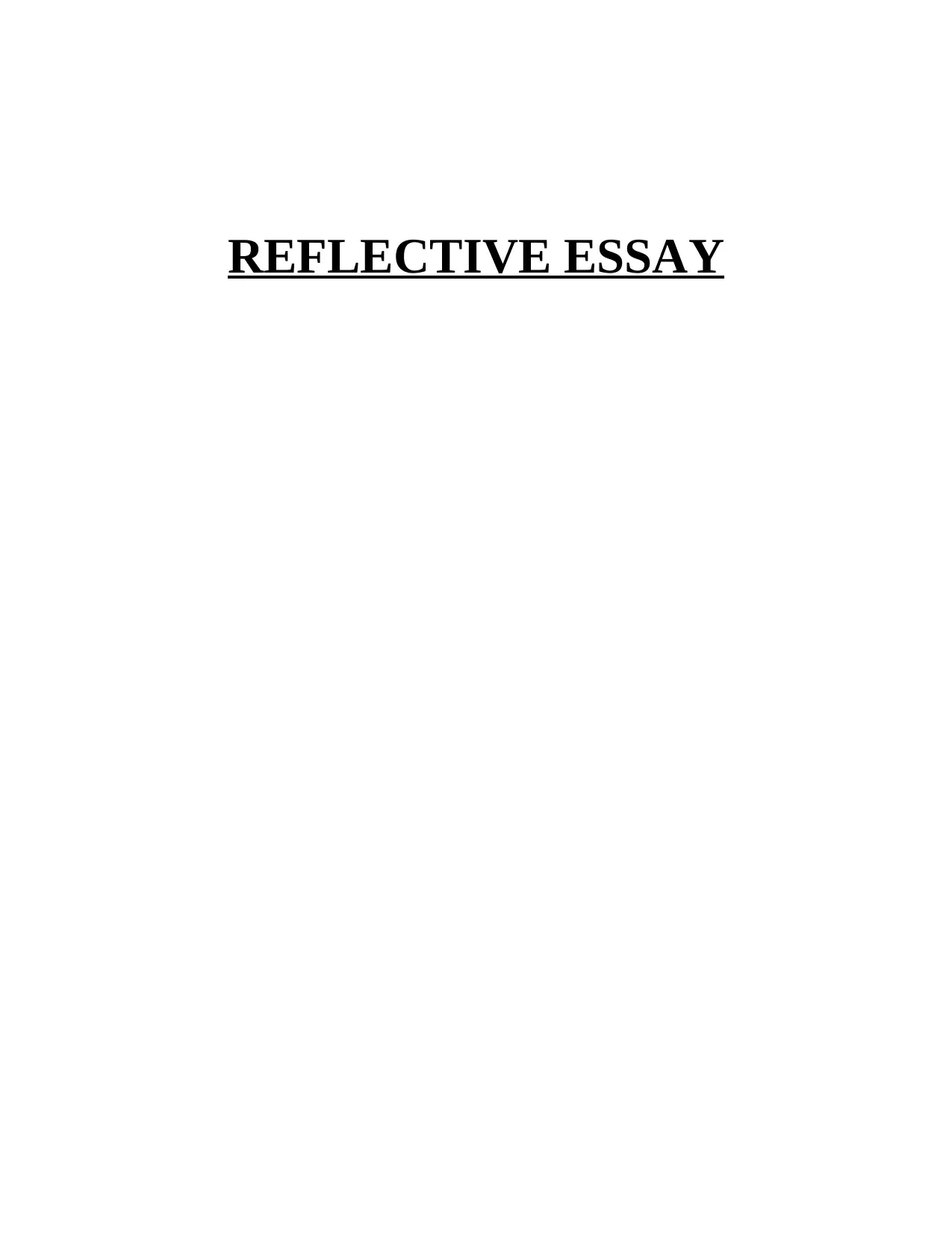
REFLECTIVE ESSAY
Paraphrase This Document
Need a fresh take? Get an instant paraphrase of this document with our AI Paraphraser
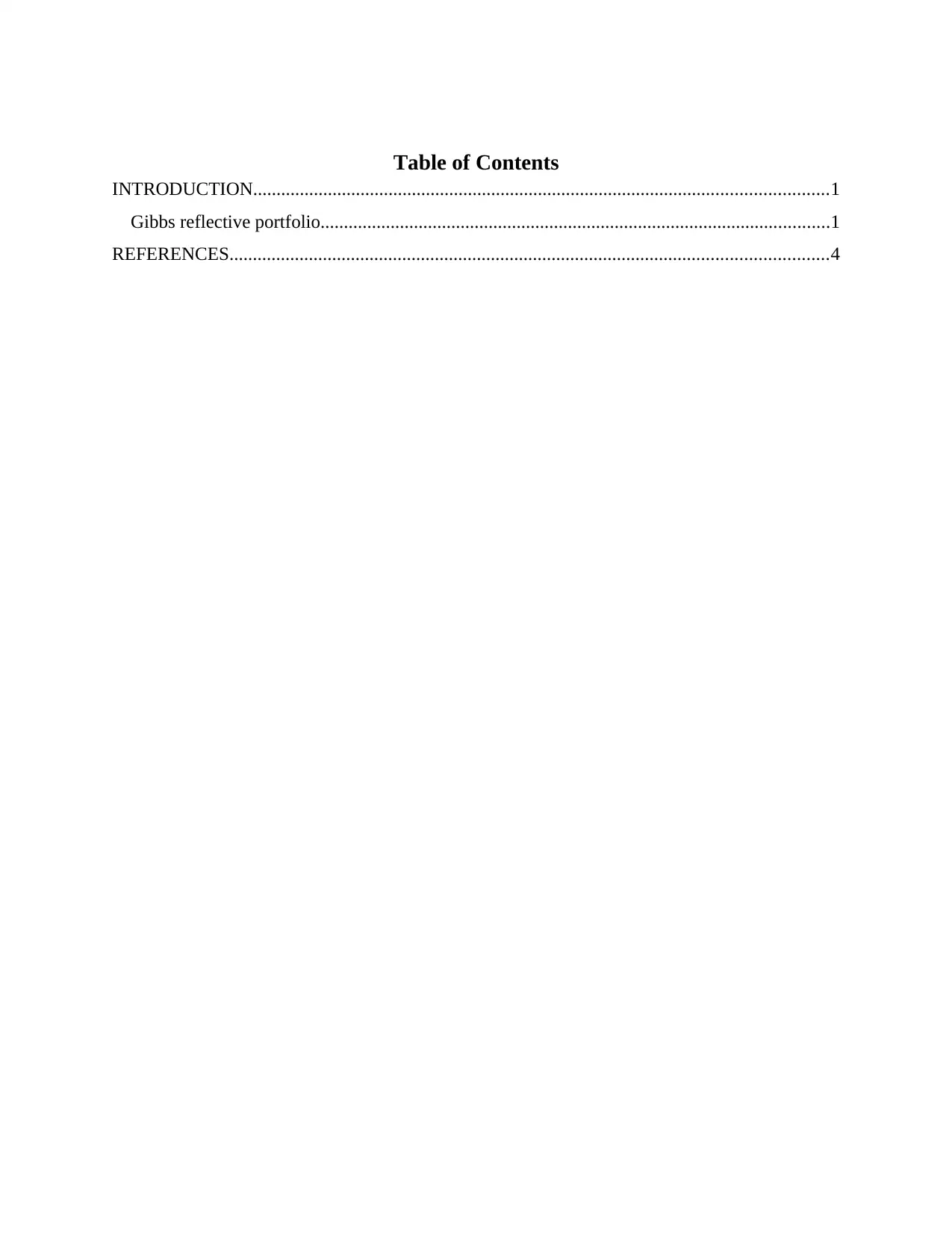
Table of Contents
INTRODUCTION...........................................................................................................................1
Gibbs reflective portfolio.............................................................................................................1
REFERENCES................................................................................................................................4
INTRODUCTION...........................................................................................................................1
Gibbs reflective portfolio.............................................................................................................1
REFERENCES................................................................................................................................4
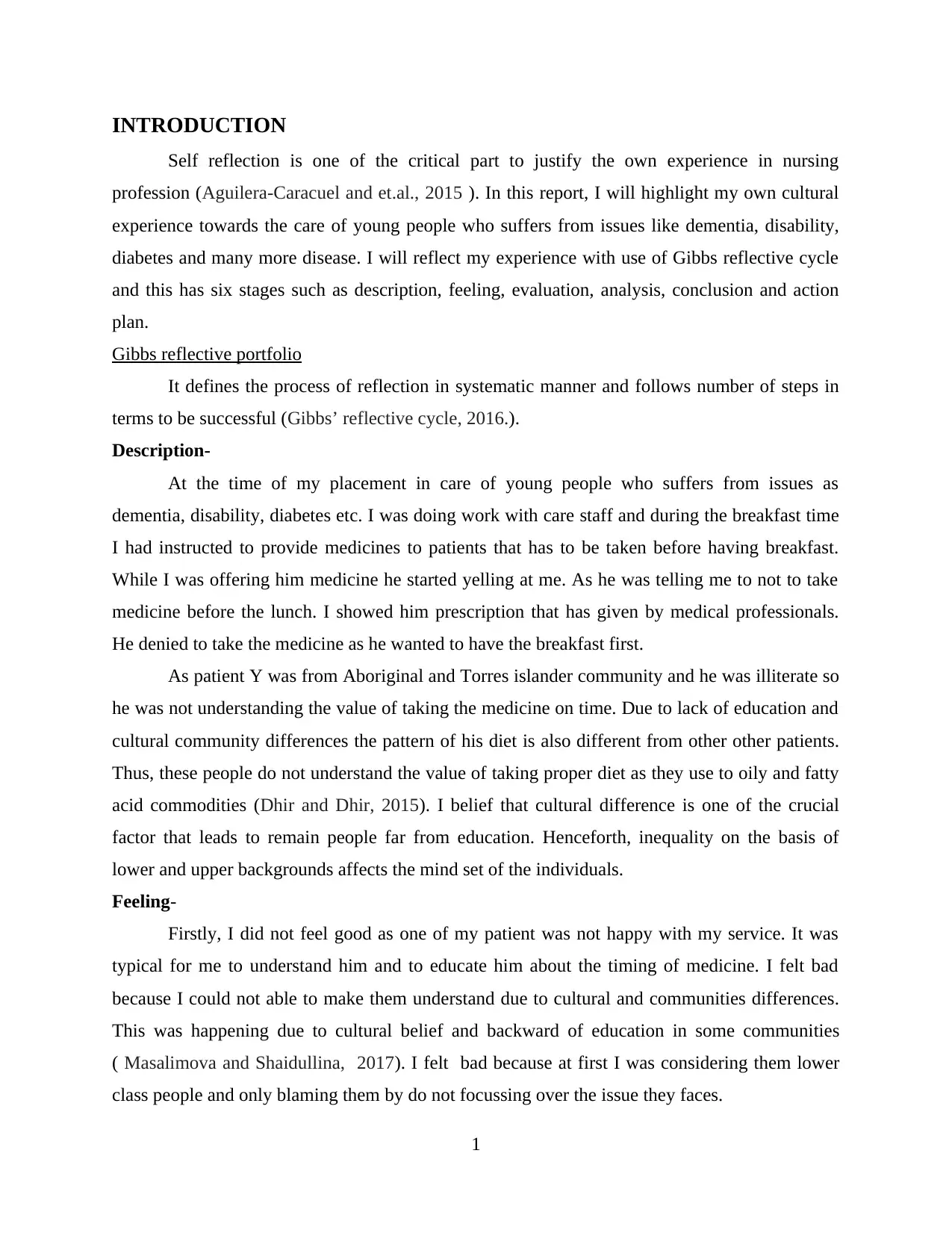
INTRODUCTION
Self reflection is one of the critical part to justify the own experience in nursing
profession (Aguilera-Caracuel and et.al., 2015 ). In this report, I will highlight my own cultural
experience towards the care of young people who suffers from issues like dementia, disability,
diabetes and many more disease. I will reflect my experience with use of Gibbs reflective cycle
and this has six stages such as description, feeling, evaluation, analysis, conclusion and action
plan.
Gibbs reflective portfolio
It defines the process of reflection in systematic manner and follows number of steps in
terms to be successful (Gibbs’ reflective cycle, 2016.).
Description-
At the time of my placement in care of young people who suffers from issues as
dementia, disability, diabetes etc. I was doing work with care staff and during the breakfast time
I had instructed to provide medicines to patients that has to be taken before having breakfast.
While I was offering him medicine he started yelling at me. As he was telling me to not to take
medicine before the lunch. I showed him prescription that has given by medical professionals.
He denied to take the medicine as he wanted to have the breakfast first.
As patient Y was from Aboriginal and Torres islander community and he was illiterate so
he was not understanding the value of taking the medicine on time. Due to lack of education and
cultural community differences the pattern of his diet is also different from other other patients.
Thus, these people do not understand the value of taking proper diet as they use to oily and fatty
acid commodities (Dhir and Dhir, 2015). I belief that cultural difference is one of the crucial
factor that leads to remain people far from education. Henceforth, inequality on the basis of
lower and upper backgrounds affects the mind set of the individuals.
Feeling-
Firstly, I did not feel good as one of my patient was not happy with my service. It was
typical for me to understand him and to educate him about the timing of medicine. I felt bad
because I could not able to make them understand due to cultural and communities differences.
This was happening due to cultural belief and backward of education in some communities
( Masalimova and Shaidullina, 2017). I felt bad because at first I was considering them lower
class people and only blaming them by do not focussing over the issue they faces.
1
Self reflection is one of the critical part to justify the own experience in nursing
profession (Aguilera-Caracuel and et.al., 2015 ). In this report, I will highlight my own cultural
experience towards the care of young people who suffers from issues like dementia, disability,
diabetes and many more disease. I will reflect my experience with use of Gibbs reflective cycle
and this has six stages such as description, feeling, evaluation, analysis, conclusion and action
plan.
Gibbs reflective portfolio
It defines the process of reflection in systematic manner and follows number of steps in
terms to be successful (Gibbs’ reflective cycle, 2016.).
Description-
At the time of my placement in care of young people who suffers from issues as
dementia, disability, diabetes etc. I was doing work with care staff and during the breakfast time
I had instructed to provide medicines to patients that has to be taken before having breakfast.
While I was offering him medicine he started yelling at me. As he was telling me to not to take
medicine before the lunch. I showed him prescription that has given by medical professionals.
He denied to take the medicine as he wanted to have the breakfast first.
As patient Y was from Aboriginal and Torres islander community and he was illiterate so
he was not understanding the value of taking the medicine on time. Due to lack of education and
cultural community differences the pattern of his diet is also different from other other patients.
Thus, these people do not understand the value of taking proper diet as they use to oily and fatty
acid commodities (Dhir and Dhir, 2015). I belief that cultural difference is one of the crucial
factor that leads to remain people far from education. Henceforth, inequality on the basis of
lower and upper backgrounds affects the mind set of the individuals.
Feeling-
Firstly, I did not feel good as one of my patient was not happy with my service. It was
typical for me to understand him and to educate him about the timing of medicine. I felt bad
because I could not able to make them understand due to cultural and communities differences.
This was happening due to cultural belief and backward of education in some communities
( Masalimova and Shaidullina, 2017). I felt bad because at first I was considering them lower
class people and only blaming them by do not focussing over the issue they faces.
1
⊘ This is a preview!⊘
Do you want full access?
Subscribe today to unlock all pages.

Trusted by 1+ million students worldwide
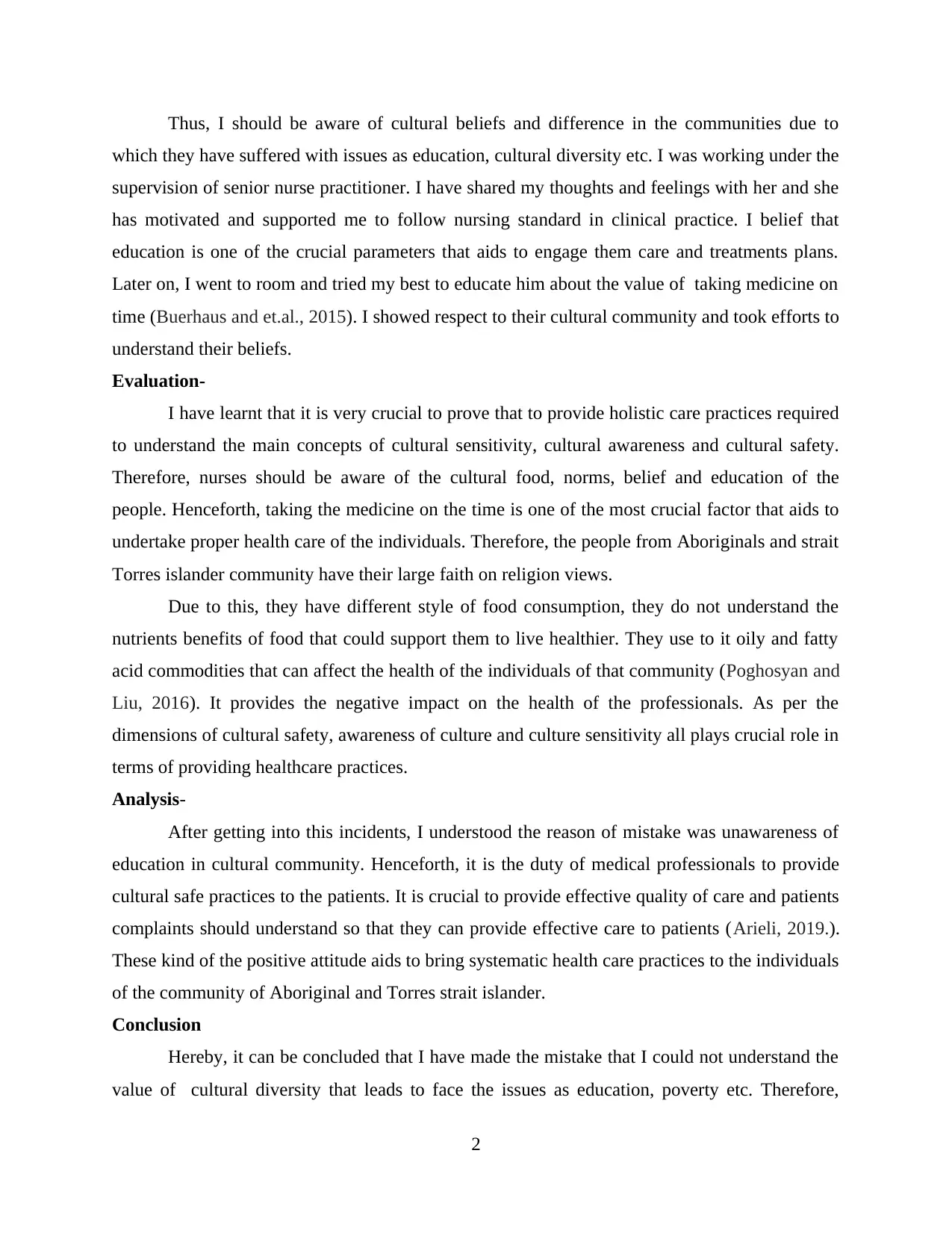
Thus, I should be aware of cultural beliefs and difference in the communities due to
which they have suffered with issues as education, cultural diversity etc. I was working under the
supervision of senior nurse practitioner. I have shared my thoughts and feelings with her and she
has motivated and supported me to follow nursing standard in clinical practice. I belief that
education is one of the crucial parameters that aids to engage them care and treatments plans.
Later on, I went to room and tried my best to educate him about the value of taking medicine on
time (Buerhaus and et.al., 2015). I showed respect to their cultural community and took efforts to
understand their beliefs.
Evaluation-
I have learnt that it is very crucial to prove that to provide holistic care practices required
to understand the main concepts of cultural sensitivity, cultural awareness and cultural safety.
Therefore, nurses should be aware of the cultural food, norms, belief and education of the
people. Henceforth, taking the medicine on the time is one of the most crucial factor that aids to
undertake proper health care of the individuals. Therefore, the people from Aboriginals and strait
Torres islander community have their large faith on religion views.
Due to this, they have different style of food consumption, they do not understand the
nutrients benefits of food that could support them to live healthier. They use to it oily and fatty
acid commodities that can affect the health of the individuals of that community (Poghosyan and
Liu, 2016). It provides the negative impact on the health of the professionals. As per the
dimensions of cultural safety, awareness of culture and culture sensitivity all plays crucial role in
terms of providing healthcare practices.
Analysis-
After getting into this incidents, I understood the reason of mistake was unawareness of
education in cultural community. Henceforth, it is the duty of medical professionals to provide
cultural safe practices to the patients. It is crucial to provide effective quality of care and patients
complaints should understand so that they can provide effective care to patients (Arieli, 2019.).
These kind of the positive attitude aids to bring systematic health care practices to the individuals
of the community of Aboriginal and Torres strait islander.
Conclusion
Hereby, it can be concluded that I have made the mistake that I could not understand the
value of cultural diversity that leads to face the issues as education, poverty etc. Therefore,
2
which they have suffered with issues as education, cultural diversity etc. I was working under the
supervision of senior nurse practitioner. I have shared my thoughts and feelings with her and she
has motivated and supported me to follow nursing standard in clinical practice. I belief that
education is one of the crucial parameters that aids to engage them care and treatments plans.
Later on, I went to room and tried my best to educate him about the value of taking medicine on
time (Buerhaus and et.al., 2015). I showed respect to their cultural community and took efforts to
understand their beliefs.
Evaluation-
I have learnt that it is very crucial to prove that to provide holistic care practices required
to understand the main concepts of cultural sensitivity, cultural awareness and cultural safety.
Therefore, nurses should be aware of the cultural food, norms, belief and education of the
people. Henceforth, taking the medicine on the time is one of the most crucial factor that aids to
undertake proper health care of the individuals. Therefore, the people from Aboriginals and strait
Torres islander community have their large faith on religion views.
Due to this, they have different style of food consumption, they do not understand the
nutrients benefits of food that could support them to live healthier. They use to it oily and fatty
acid commodities that can affect the health of the individuals of that community (Poghosyan and
Liu, 2016). It provides the negative impact on the health of the professionals. As per the
dimensions of cultural safety, awareness of culture and culture sensitivity all plays crucial role in
terms of providing healthcare practices.
Analysis-
After getting into this incidents, I understood the reason of mistake was unawareness of
education in cultural community. Henceforth, it is the duty of medical professionals to provide
cultural safe practices to the patients. It is crucial to provide effective quality of care and patients
complaints should understand so that they can provide effective care to patients (Arieli, 2019.).
These kind of the positive attitude aids to bring systematic health care practices to the individuals
of the community of Aboriginal and Torres strait islander.
Conclusion
Hereby, it can be concluded that I have made the mistake that I could not understand the
value of cultural diversity that leads to face the issues as education, poverty etc. Therefore,
2
Paraphrase This Document
Need a fresh take? Get an instant paraphrase of this document with our AI Paraphraser
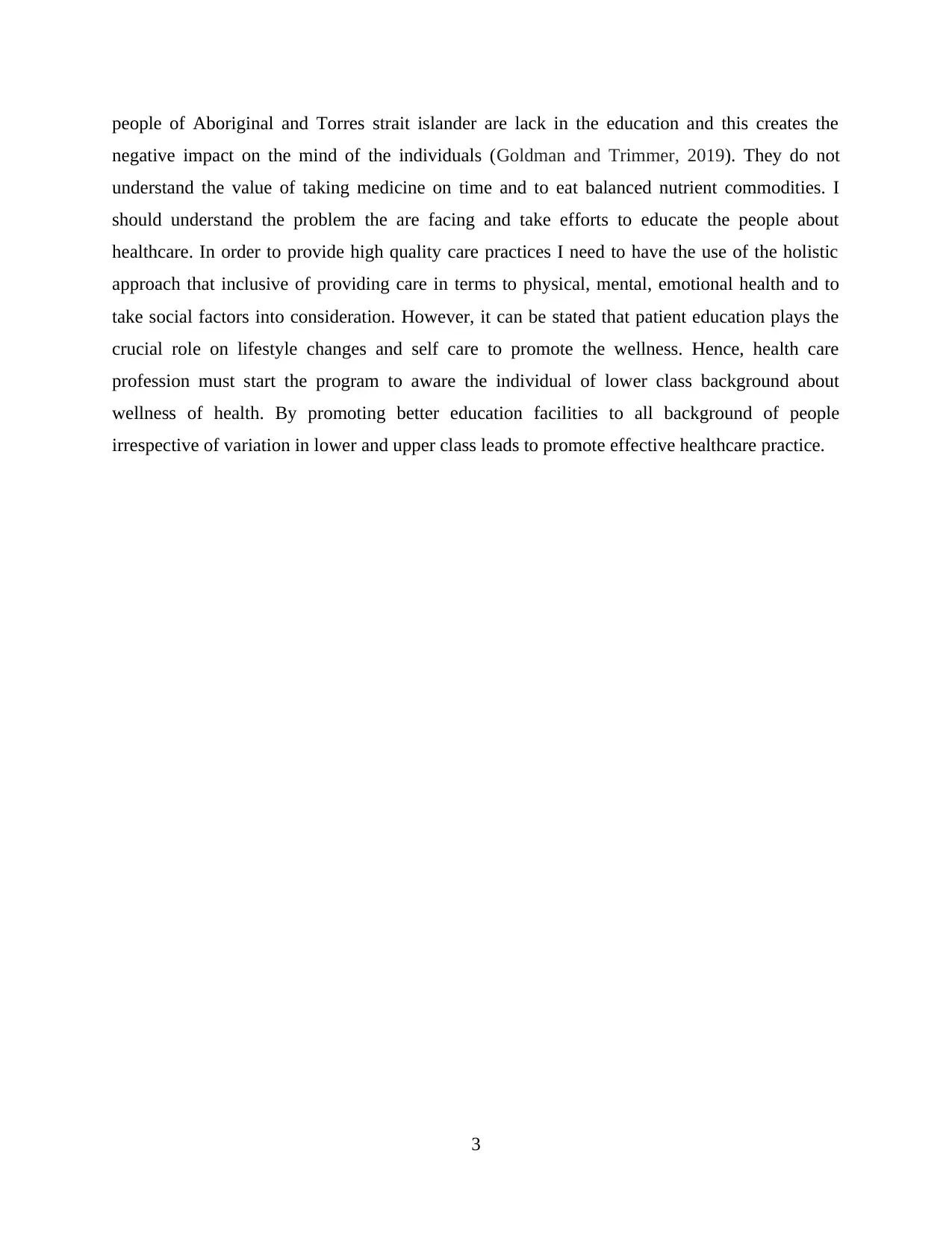
people of Aboriginal and Torres strait islander are lack in the education and this creates the
negative impact on the mind of the individuals (Goldman and Trimmer, 2019). They do not
understand the value of taking medicine on time and to eat balanced nutrient commodities. I
should understand the problem the are facing and take efforts to educate the people about
healthcare. In order to provide high quality care practices I need to have the use of the holistic
approach that inclusive of providing care in terms to physical, mental, emotional health and to
take social factors into consideration. However, it can be stated that patient education plays the
crucial role on lifestyle changes and self care to promote the wellness. Hence, health care
profession must start the program to aware the individual of lower class background about
wellness of health. By promoting better education facilities to all background of people
irrespective of variation in lower and upper class leads to promote effective healthcare practice.
3
negative impact on the mind of the individuals (Goldman and Trimmer, 2019). They do not
understand the value of taking medicine on time and to eat balanced nutrient commodities. I
should understand the problem the are facing and take efforts to educate the people about
healthcare. In order to provide high quality care practices I need to have the use of the holistic
approach that inclusive of providing care in terms to physical, mental, emotional health and to
take social factors into consideration. However, it can be stated that patient education plays the
crucial role on lifestyle changes and self care to promote the wellness. Hence, health care
profession must start the program to aware the individual of lower class background about
wellness of health. By promoting better education facilities to all background of people
irrespective of variation in lower and upper class leads to promote effective healthcare practice.
3
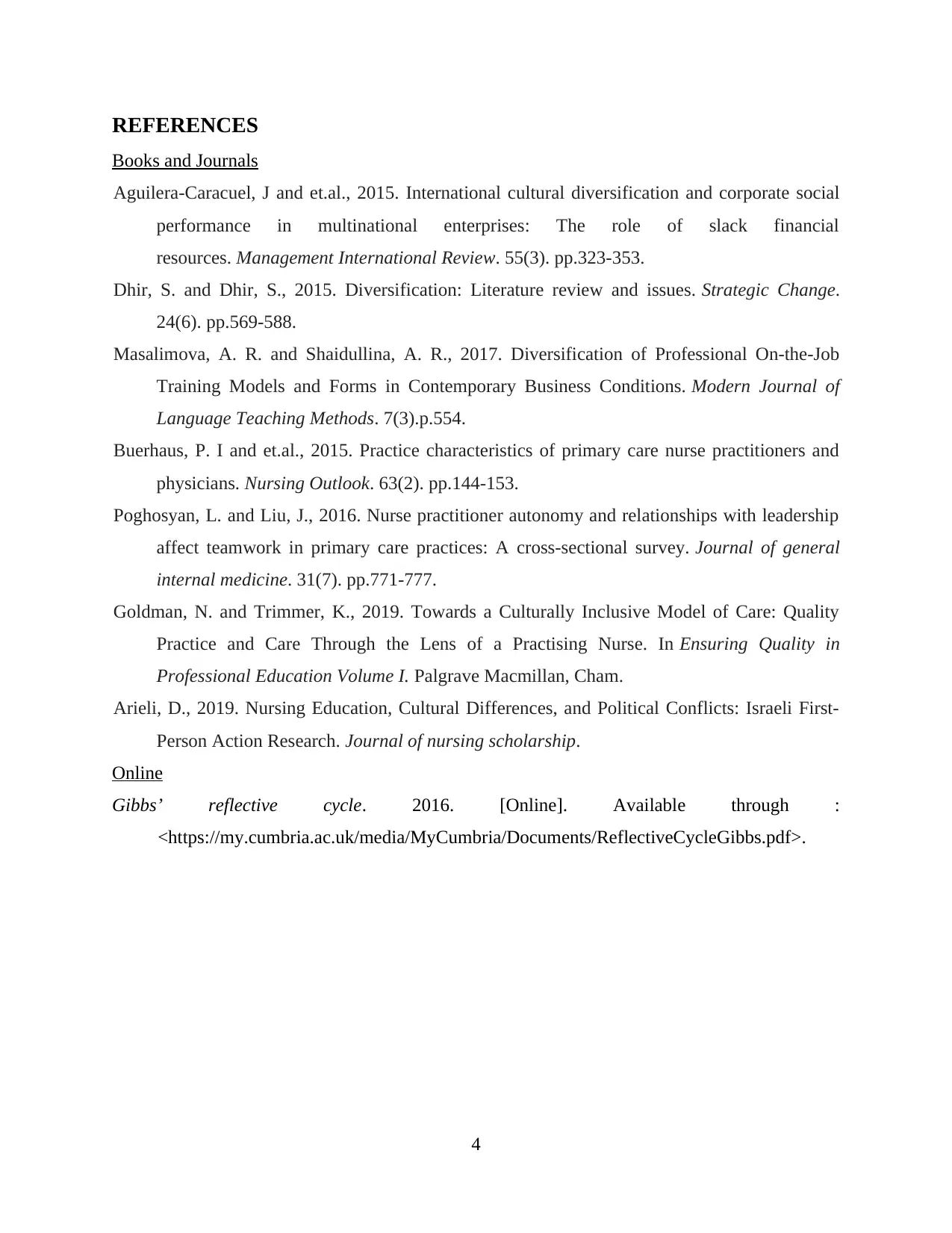
REFERENCES
Books and Journals
Aguilera-Caracuel, J and et.al., 2015. International cultural diversification and corporate social
performance in multinational enterprises: The role of slack financial
resources. Management International Review. 55(3). pp.323-353.
Dhir, S. and Dhir, S., 2015. Diversification: Literature review and issues. Strategic Change.
24(6). pp.569-588.
Masalimova, A. R. and Shaidullina, A. R., 2017. Diversification of Professional On-the-Job
Training Models and Forms in Contemporary Business Conditions. Modern Journal of
Language Teaching Methods. 7(3).p.554.
Buerhaus, P. I and et.al., 2015. Practice characteristics of primary care nurse practitioners and
physicians. Nursing Outlook. 63(2). pp.144-153.
Poghosyan, L. and Liu, J., 2016. Nurse practitioner autonomy and relationships with leadership
affect teamwork in primary care practices: A cross-sectional survey. Journal of general
internal medicine. 31(7). pp.771-777.
Goldman, N. and Trimmer, K., 2019. Towards a Culturally Inclusive Model of Care: Quality
Practice and Care Through the Lens of a Practising Nurse. In Ensuring Quality in
Professional Education Volume I. Palgrave Macmillan, Cham.
Arieli, D., 2019. Nursing Education, Cultural Differences, and Political Conflicts: Israeli First‐
Person Action Research. Journal of nursing scholarship.
Online
Gibbs’ reflective cycle. 2016. [Online]. Available through :
<https://my.cumbria.ac.uk/media/MyCumbria/Documents/ReflectiveCycleGibbs.pdf>.
4
Books and Journals
Aguilera-Caracuel, J and et.al., 2015. International cultural diversification and corporate social
performance in multinational enterprises: The role of slack financial
resources. Management International Review. 55(3). pp.323-353.
Dhir, S. and Dhir, S., 2015. Diversification: Literature review and issues. Strategic Change.
24(6). pp.569-588.
Masalimova, A. R. and Shaidullina, A. R., 2017. Diversification of Professional On-the-Job
Training Models and Forms in Contemporary Business Conditions. Modern Journal of
Language Teaching Methods. 7(3).p.554.
Buerhaus, P. I and et.al., 2015. Practice characteristics of primary care nurse practitioners and
physicians. Nursing Outlook. 63(2). pp.144-153.
Poghosyan, L. and Liu, J., 2016. Nurse practitioner autonomy and relationships with leadership
affect teamwork in primary care practices: A cross-sectional survey. Journal of general
internal medicine. 31(7). pp.771-777.
Goldman, N. and Trimmer, K., 2019. Towards a Culturally Inclusive Model of Care: Quality
Practice and Care Through the Lens of a Practising Nurse. In Ensuring Quality in
Professional Education Volume I. Palgrave Macmillan, Cham.
Arieli, D., 2019. Nursing Education, Cultural Differences, and Political Conflicts: Israeli First‐
Person Action Research. Journal of nursing scholarship.
Online
Gibbs’ reflective cycle. 2016. [Online]. Available through :
<https://my.cumbria.ac.uk/media/MyCumbria/Documents/ReflectiveCycleGibbs.pdf>.
4
⊘ This is a preview!⊘
Do you want full access?
Subscribe today to unlock all pages.

Trusted by 1+ million students worldwide
1 out of 6
Related Documents
Your All-in-One AI-Powered Toolkit for Academic Success.
+13062052269
info@desklib.com
Available 24*7 on WhatsApp / Email
![[object Object]](/_next/static/media/star-bottom.7253800d.svg)
Unlock your academic potential
Copyright © 2020–2026 A2Z Services. All Rights Reserved. Developed and managed by ZUCOL.





